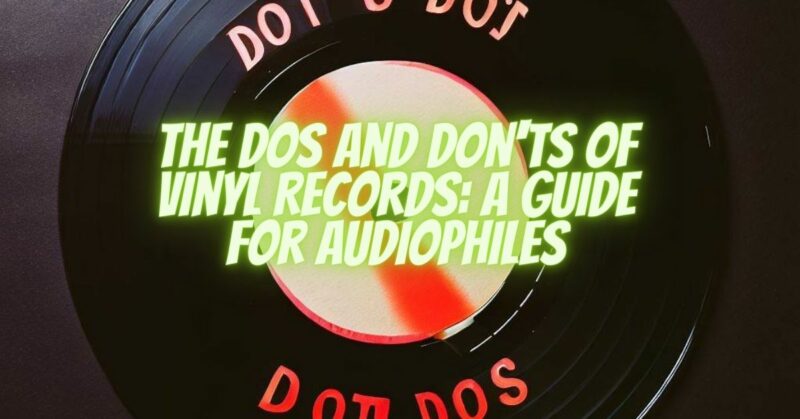In an era dominated by digital music, vinyl records have made a remarkable comeback, captivating both old-school audiophiles and new enthusiasts alike. The rich sound, physicality, and nostalgic charm of vinyl make it a unique and cherished format. However, to preserve the quality and longevity of your vinyl collection, it’s crucial to understand the dos and don’ts of handling, storing, and maintaining these precious records. In this article, we will explore the essential guidelines that every vinyl lover should know.
Part 1: Handling Vinyl Records
1. Do handle records with clean hands: Always ensure your hands are clean and dry before handling vinyl records. Oils, dirt, and moisture can damage the delicate grooves and affect sound quality.
2. Do hold records by the edges or the label: Avoid touching the playing surface to prevent fingerprints, scratches, or smudges. Hold the record gently by the edges or use the center label as a safe gripping point.
3. Don’t stack or drop records: Stacking records vertically without proper support can lead to warping or damage. Avoid dropping records, as this can cause cracks, chips, or broken edges.
4. Don’t touch the grooves: Never touch the grooves of a vinyl record with your fingers or any sharp objects. Scratches can permanently impact the sound quality and reduce the value of the record.
Part 2: Cleaning and Maintenance
1. Do clean records before playing: Regular cleaning is essential to remove dust, dirt, and static buildup. Use a carbon fiber brush or a record cleaning solution with a microfiber cloth to gently clean the surface in a circular motion.
2. Do store records in dust-free sleeves: Keep your vinyl records in protective inner sleeves made of anti-static material. This prevents dust accumulation, reduces static electricity, and safeguards the record surface.
3. Don’t use alcohol or household cleaners: Avoid using alcohol, glass cleaners, or household cleaners for cleaning records, as they can damage the vinyl material. Stick to purpose-made record cleaning solutions or distilled water mixed with a small amount of mild detergent.
4. Don’t expose records to extreme temperatures or sunlight: Vinyl records are sensitive to heat, so store them in a cool, dry place away from direct sunlight. Exposure to extreme temperatures can cause warping or melting of the vinyl.
Part 3: Playing and Storing Vinyl Records
1. Do use a high-quality turntable and cartridge: Invest in a good turntable with a quality cartridge to ensure accurate tracking and minimal wear on your records. A poorly set-up turntable or a cheap cartridge can cause excessive wear and compromise sound quality.
2. Do handle records with care during playback: When placing a record on the turntable, hold it by the edges and gently lower it onto the platter. Avoid forcefully dropping the needle onto the record to prevent scratches and sudden shock to the stylus.
3. Don’t play records with a dirty or worn-out stylus: A dirty or worn-out stylus can damage your vinyl records. Regularly clean the stylus with a stylus brush or use a stylus cleaner solution to remove debris and maintain optimal performance.
4. Don’t overcrowd records during storage: Store your vinyl records in an upright position, never flat or leaning. Avoid overcrowding the records, as this can lead to pressure marks, warping, or deformation of the sleeves.
Conclusion
Vinyl records are a cherished format that requires special care and attention. By following the dos and don’ts outlined in this article, you can ensure the longevity and pristine condition of your vinyl collection. Remember to handle records delicately, clean them regularly, use proper equipment, and store them in a controlled environment. By doing so, you’ll be able to enjoy the warm, authentic sound of vinyl for years to come, preserving the magic of this timeless format for future generations.

